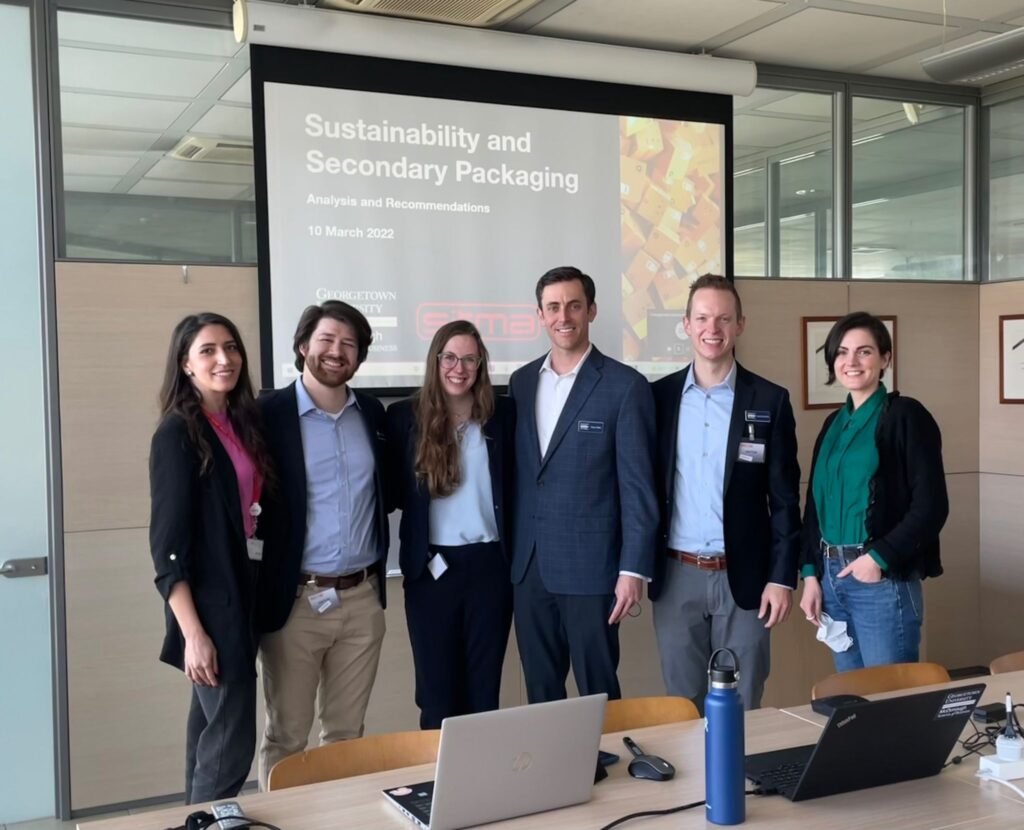Sitma works with university towards packaging sustainability
30th March 2022

As part of the Georgetown University McDonough School of Business Global Business Experience Programme, Sitma was invited to submit a project proposal to be implemented with the support and guidance of a team of students from the 2022 Flex MBA class.
Sitma, which has long been acclaimed for its numerous research and collaboration activities with various universities, immediately identified an attractive topic of interest to them on which to base the business project.
The purpose of the project?
To develop a method to analyse and contain CO2 consumption and emissions deriving from the automatic packaging processes of Sitma lines with a specific focus on e-commerce solutions and then define a go-to-market strategy. This is the first step towards the development of tools with strong ethical and commercial value, which can be an added value for customers in the logistics and packaging sector.
Sitma has always kept a close eye on sustainability and has been leading the way in studying solutions to reduce the environmental impact deriving from the use of its machines. For example, it developed packaging systems that can use paper instead of plastic, as well as solutions that can create packaging tailored to the contents to minimise waste. However, the company wanted to go a step further and look for tools able to provide objective data and values.
This is where the partnership with Georgetown University came into play: the US university, one of the most prestigious in the world, has specific skills in the sector and provided a team of young students, with a mix of skills and truly extensive and diverse experiences, who turned the project into their business case for the MBA.
The people who made a difference
Amanda Patterson, Dylan Mills, Tony Vieira and Aaron Knowlson were the real protagonists of this sustainability project with the right mix of skills and experiences that examined and effectively analysed the e-commerce market in the United States and then proposed different scenarios to the Sitma team. The team showed real dedication and determination right from the start, characteristics that then made the difference when it came to realising this ambitious project.
The American team’s desire to get involved and show the skills acquired during the 2-3 years of the MBA, as well as the helpfulness and willingness of the Sitma team to collaborate on new projects, were the key factors for the success of this project. The work team immediately found the perfect synergy, which led to an interesting exchange of ideas, views, proposals and suggestions.
Distance and time zone were not a problem for the teams, who shared information, demos, results and questions through online meetings on a weekly basis from November 2021 to March 2022. The team of students immediately showed great interest and dedication to a topic they, too, felt was very interesting.
After an initial period during which they collected ideas and information from January 2022, Sitma saw the tool take shape. The Georgetown team developed complex simulations of different scenarios, studying how to set parameters again and reconfigure the machines according to the different manufacturing conditions and the packaging materials used, completing a path Sitma had already undertaken.
With great mutual satisfaction, the project ended on 10th March when the Georgetown team visited the company’s headquarters during their journey in Italy at the end of the course, accompanied by professors José de la Torre and Kasra Ferdows. The team of students presented the results of the project to a wide audience, including high-level Sitma personnel. Extensive input emerged from this interesting working table, suggesting that there is still a long road ahead, but at the same time that it is the right road to follow.
The final project
Along with an intelligent system to recognise and track the material used on automatic packaging machines, Sitma has decided to create a synergy with a dedicated software with the aim of mapping the packaging process to then ensure limited energy consumption and the impact on the environment.
After an initial analytical phase, the study was based on the implementation of a tool capable of collecting and analysing data as precisely and objectively as possible. It also discussed the stages before and after packaging, for example by examining the end-of-life stage for packaging and products.
In short, the project with Georgetown University is the first step towards the development of increasingly precise systems to assess the impact of both individual processes and of the supply chain as a whole. The added value, as the team highlighted at the end of the project itself, lies in the opportunity to differentiate sustainability and provide not only absolute but also comparative data with respect to solutions that are more polluting and/or with a greater impact.
This has beneficial repercussions on the environment and is also an important commercial tool, as it meets the demands of the market and end users.

